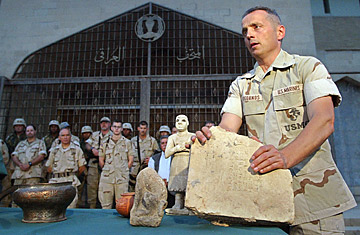
U.S. Colonel Matthew Bogdanos
As the tanks rolled into Iraq in March, 2003, Marine Colonel Matthew Bogdanos and his counterterrorism team followed right behind. Tasked with investigating battle-related criminal activity, the team was soon redirected to Iraq's National Museum when news broke that priceless artifacts were being looted. They camped out in the museum for the remainder of his tour of duty, tallying the artifacts stolen and hunting down the thieves. It was, perhaps, serendipity or kismet, that Bogdanos, who holds advanced degrees in law and classics from Columbia University, would be present to take on the task of recovering some of the world's greatest stolen treasures. In his book Thieves of Baghdad, Bogdanos describes the looting, and the ongoing investigation, with passion, erudition and candor. TIME sat down with Bogdanos on the eve of the sixth anniversary of the beginning of the Iraq war. (Watch the interview with Bogdanos.)
Let's chat first about the reopening of the Iraqi museum recently in Baghdad. When you saw that on the news, what was on you mind?
It was an extraordinary first step. The Iraq museum is home to the single finest collection of Mesopotamian antiquities the world has ever seen: The Vase of Warka, the first naturalist depiction of human life in stone; The Mask of Warka, the first naturalist depiction of the human face; The Bassetki statue, the first known lost-wax method of copper casting. On and on and on. Every step you take in the Iraq museum, you get to say "the first." If there were truly a cradle of civilization, you can't get closer to it than the Iraq museum. Its opening proclaims to the world that Iraq is more than just a bunch of bombers and people who would murder each other in the name of religion. It's not perfect. There are 28 galleries; two were opened. They were only open for a couple hours. But it was a beginning.
And this museum has not been open like that in some time, right?
Correct. In fact the museum was closed in September of 1980 when Saddam Hussein invaded Iran and Iran started lobbing missiles into Baghdad. So the museum was closed from that time until opening for a day in 2003 and then until this opening. [It's] only been open fewer than a half dozen times and never open to the general public. The museum itself, in the last several decades has been called Saddam's gift shop by the average Iraqi. (See pictures of treasure hunting in Afghanistan.)
What has it taken since 2003 to get to this point?
I lived in the museum for my entire first tour in Iraq in 2003. What it took to get from there — a devastated, closed, sealed-shut museum that had been looted by neighborhood residents, government officials and some museum staff members — to today where it's able to open a couple of galleries for a couple of hours relied almost exclusively on the extraordinary heroism, conscientiousness and integrity of the Iraqi people. From April of 2003 until November 2003 — the last time I physically hand-counted the items — almost 2000 different antiquities stolen from the museum were returned to the museum under our amnesty program by almost 2000 Iraqis. That's exceptional; that's courage.
But it also took some courage on the part of the Iraqi government. There is controversy within the government. The minister of culture believes that the museum should not be opened until all galleries are able to be opened and the security situation improves. That's a legitimate, fair argument. I disagree with that argument, but it's a fair one. The ministry of tourism and antiquities, on the other hand, shares my belief, which is: open it today, one gallery for one hour. And tomorrow it's one gallery for two hours. And on and on. And you enable all of Iraq to take ownership of their museum and you enable, you force the world to sit up and take notice. Iraq is more than just bombs and war. It's about history.
One thing I was struck by in your book was how many people actually brought these items back because they realized that this was their heritage.
It's impossible to narrow down the list of motives as to why Iraqis returned the items. Having spent many years now in the Middle East, in Iraq in particular, I have learned if you're ever given a multiple choice test in Iraq, and one of the choices is "All of the Above," always pick "All of the Above." You're never going to be wrong. That's pretty much how it was with the return of the antiquities.
Even today, news articles cite the looting in 2003 as a symbol of the chaos that followed the invasion. Is that fair?
I do think it is fair to say the looting of the Iraq museum is symbolic of the chaos in 2003. Perhaps it is another reason why the Iraqi government felt so strongly about opening it to proclaim, if you will, "The chaos is over." Or that the chaos has been controlled to the extent that we can control chaos.
